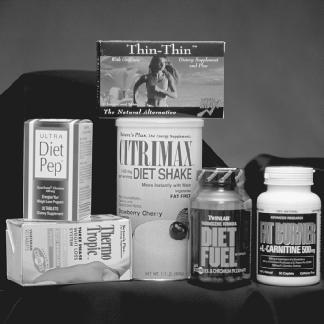Over-the-Counter Drugs - Other common otc drugs
There are certain OTC drugs that are somewhat controversial in nature because they are known to be addictive (habit-forming) or because they have been linked to abuse and misuse, such as sleep aids and diet pills. There are other OTC drugs that a person might not naturally recognize as being an actual "drug," such as caffeine, which is considered a drug that, when misused, can have dangerous effects.
Caffeine and Caffeine-Based Stimulants
Caffeine is classified as a drug by the FDA. An organic (natural) compound, caffeine has a stimulating (speeds up or excites) effect on the central nervous system, heart, blood vessels, and kidneys. Caffeine can also make a person feel more alert and less tired. It can also cause irritability, nervousness, jitters, headaches, anxiety, and insomnia (sleeplessness). Consumed in excess, caffeine can cause heart palpitations, diarrhea, and vomiting. Some research studies have suggested that caffeine plays a role in the development of birth defects, ulcers, breast disease, diabetes, heart disease, osteoporosis, and high blood pressure. Girls, in particular, should avoid consuming caffeine if they are experiencing PMS (Pre-menstrual Syndrome) as it can make the symptoms worse.
HOW MUCH CAFFEINE?
Doctors recommend a daily caffeine intake of no more than 200 mg (milligrams) or less. How much caffeine is in what you eat and drink?
- Chocolate cake—1 slice 30 mg
- Cola—12 oz 45 mg
- Ice tea—5 oz 100 mg
- Coffee—6 oz 175 mg
Some OTC drugs have caffeine, too:
- Anacin 64 mg
- Excedrin 130 mg
- NoDoz 200 mg
Because caffeine is found in many common products, it can be easy to consume too much of it. Coffee, tea, many soft drinks, chocolate, and many medications, such as pain relievers and weight loss aids, all contain caffeine. To help maintain alertness and prevent sleep, people often use OTC stimulant products containing caffeine. However, because of the side effects that accompany the excessive use of caffeine or any kind of stimulant, these products are intended for short-term use only.
Why do people use OTC stimulants to stay awake if they can drink coffee or have a caffeinated soft drink? Compared to caffeinated beverages, the caffeine used in brand name products such as Vivarin and NoDoz tends to be less irritating to the stomach than that which is found in coffee.
Nicotine and Nicotine-Replacement Products
Like caffeine, nicotine is also considered a drug. Nicotine is an organic compound found in tobacco leaves. These leaves are used to make cigarettes, chewing tobacco, and other tobacco-based products. Since nicotine is addictive, regular smokers tend to become addicted to nicotine. And, in spite of the fact that many people use tobacco on a regular basis, nicotine is highly toxic (poisonous) in large doses, which can cause vomiting, nausea, headaches, stomach pains, convulsions, paralysis, and even death. In fact, nicotine is toxic enough that it is a component in some insecticides.

The very thing that causes smokers to become addicted to smoking, however, can be used to help them quit. Smoking provides a steady supply of nicotine, which causes smokers' bodies and brains to crave nicotine when they cease smoking. Often these cravings are so strong they make smokers very likely to start smoking again after they attempt to quit. Ironically, nicotine is used in nicotine replacement therapy (NRT) products. NRT products are temporary aids that are used on a regular schedule; they provide the body with nicotine but do so without necessitating the user to smoke. Over time, these products, which are available in many forms, including the patch, pills, and chewing gum, help lessen nicotine cravings and also help smokers move away from the actual habit of lighting up a cigarette or chewing tobacco. All of this contributes to the diminishment of withdrawal symptoms. In many of the products, the dosage of nicotine is gradually decreased to help smokers wean themselves off nicotine.
Sleep Aids
When people don't get enough sleep, they often feel tired, overwhelmed, and stressed out. In fact, too much stress could even be the reason they aren't getting enough sleep.
There are several types of sleep disturbances. Sleep disturbances fall under the sleep disorder category of insomnia, which is a difficulty falling or staying asleep or a disturbance in sleep that causes individuals to feel as though they did not get an adequate amount of sleep. Transient insomnia lasts only a few days and doesn't require treatment. This is usually the result of a temporary worry or discomfort from a minor illness. If people have chronic, or long lasting, lack of sleep, they need to see doctors instead of trying to treat the problem themselves. Chronic sleeplessness could be caused by psychological (mind-related) problems, such as severe anxiety or depression, or by a physical disorder.
Most OTC sleep aids work by interfering with the chemical activity in the brain and nervous system by limiting communication between the nerve cells. This reduction in brain activity allows a person to fall asleep more easily. Many sleep aids use the antihistamines diphenhydramine and doxylamine to depress brain function. (Antihistamines are drugs that relieve the symptoms of allergies or colds.) With this in mind, anyone taking antihistamines should not be taking sleep aids containing the same ingredient and vice versa. Sominex and Unisom are two examples of brand name sleep aids that contain antihistamines.
MANY PEOPLE THINK THAT DRINKING WARM MILK WILL HELP THEM GET TO SLEEP. IN FACT, WARM MILK CONTAINS A CHEMICAL CALLED TRYPTOPHAN THAT MAY ACTUALLY DISTURB SLEEP INSTEAD OF PROMOTING IT.
GETTING TO SLEEP NATURALLY
Here are some ways to promote sleep without using medication:
- Watch caffeine intake, and avoid consuming caffeine late in the day or at night.
- Avoid strenuous exercise for two to three hours before bedtime.
- Skip bedtime snacks.
- Try to go to bed at the same time each night.
- Minimize light and noise at bedtime.
- Do something relaxing before bed—reading, lounging, or taking a bath.
- Stop worrying! Try writing worries down to clear your mind before going to bed.
- Don't use bed for studying or watching TV.
Transient insomnia, which lasts less than three weeks, is treatable with OTC sleep aids, which should be used only when lack of sleep is affecting a person's general health. The purpose of the sleep aids is to reestablish the habit of sleeping, and their effectiveness is reduced rapidly after the first few nights; this means that they work best for a limited time. OTC sleep aids should not be used for more than seven to ten days or by children under the age of twelve.
Sleep aids, by virtue of their purpose, may cause drowsiness, slowed reactions, and slurred speech. Most people who use them are asleep within an hour of taking them. However, the sleep induced by sleep aids is not the same as the sleep one experiences when falling asleep naturally. Because of this, then, people taking sleep aids often feels less rested than if they had fallen asleep naturally. One reason for this may be that these drugs suppress rapid eye movement (REM) sleep, the stage of sleep during which people have dreams. All stages of sleep are important to awakening in the morning feeling rested.
Non-antihistamine sleep aids can be addictive if taken regularly for more than a few weeks or in large doses. This is a danger, as the effects of all OTC sleep aids will diminish after a few nights' use. This may prompt a user to take more than the recommended dose. When people who exceed the recommended dose stop taking these drugs after becoming dependent upon them, they may experience sleeplessness, anxiety, seizures or hallucinations. They may also have nightmares or vivid dreams because the amount of REM sleep suddenly increases again.
Some analgesic (pain-relieving) or anti-fever drugs can also induce sleep. These are most effective if pain is keeping a person from falling asleep. People should avoid these drugs if they have are allergic to aspirin or acetaminophen.
Weight Loss Aids
OTC weight loss aids are designed to suppress (restrain) the appetite. The main ingredient in weight loss drugs such as Dexatrim or Acutrim is phenylpropanolamine (PPA). PPA disrupts the hunger signals being sent by the brain and gives people a dry mouth, which makes food taste bland and unappetizing. The effectiveness of weight loss aids, particularly PPA, is a highly debated issue. One study showed that people using PPA lost only five pounds more than those who were not using the drug at all. Furthermore, PPA has been shown to be effective for only three months.
Another factor working against PPA is that low doses of it are not very effective, and high doses can cause nervousness, nausea, insomnia, headaches, and high blood pressure. Elevated blood pressure can lead to an increased risk for stroke and other cardiac problems in individuals predisposed to these ailments. Because all of these side effects will worsen with time, PPA is not to be used for more than three months, and it should not be used by anyone under the age of eighteen or over the age of sixty. Weight loss aids containing PPA should not be used in conjunction with cold and cough medicines, as many contain PPA as well, thus putting too much PPA into the consumer's system at once.
The FDA recently banned 111 other ingredients in OTC weight loss aids because their effectiveness could not be proven. These ingredients include

alcohol, vitamin C, caffeine, sodium, and yeast. The FDA is still investigating PPA.

Comment about this article, ask questions, or add new information about this topic: